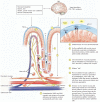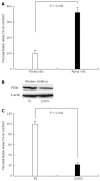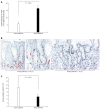Increased susceptibility of aging gastric mucosa to injury: the mechanisms and clinical implications
- PMID: 24782600
- PMCID: PMC4000484
- DOI: 10.3748/wjg.v20.i16.4467
Increased susceptibility of aging gastric mucosa to injury: the mechanisms and clinical implications
Abstract
This review updates the current views on aging gastric mucosa and the mechanisms of its increased susceptibility to injury. Experimental and clinical studies indicate that gastric mucosa of aging individuals-"aging gastropathy"-has prominent structural and functional abnormalities vs young gastric mucosa. Some of these abnormalities include a partial atrophy of gastric glands, impaired mucosal defense (reduced bicarbonate and prostaglandin generation, decreased sensory innervation), increased susceptibility to injury by a variety of damaging agents such as ethanol, aspirin and other non-steroidal anti-inflammatory drugs (NSAIDs), impaired healing of injury and reduced therapeutic efficacy of ulcer-healing drugs. Detailed analysis of the above changes indicates that the following events occur in aging gastric mucosa: reduced mucosal blood flow and impaired oxygen delivery cause hypoxia, which leads to activation of the early growth response-1 (egr-1) transcription factor. Activation of egr-1, in turn, upregulates the dual specificity phosphatase, phosphatase and tensin homologue deleted on chromosome ten (PTEN) resulting in activation of pro-apoptotic caspase-3 and caspase-9 and reduced expression of the anti-apoptosis protein, survivin. The imbalance between pro- and anti-apoptosis mediators results in increased apoptosis and increased susceptibility to injury. This paradigm has human relevance since increased expression of PTEN and reduced expression of survivin were demonstrated in gastric mucosa of aging individuals. Other potential mechanisms operating in aging gastric mucosa include reduced telomerase activity, increase in replicative cellular senescence, and reduced expression of vascular endothelial growth factor and importin-α-a nuclear transport protein essential for transport of transcription factors to nucleus. Aging gastropathy is an important and clinically relevant issue because of: (1) an aging world population due to prolonged life span; (2) older patients have much greater risk of gastroduodenal ulcers and gastrointestinal complications (e.g., NSAIDs-induced gastric injury) than younger patients; and (3) increased susceptibility of aging gastric mucosa to injury can be potentially reduced or reversed pharmacologically.
Keywords: Aging gastric mucosa; Apoptosis; Hypoxia; Injury; Phosphatase and tensin homologue deleted on chromosome ten-PTEN; Survivin.
Figures












References
-
- Tarnawski A, Pai R, Deng X, Ahluwalia A, Khomenko T, Tanigawa T, Akahoshi T, Sandor Z, Szabo S. Aging gastropathy-novel mechanisms: hypoxia, up-regulation of multifunctional phosphatase PTEN, and proapoptotic factors. Gastroenterology. 2007;133:1938–1947. - PubMed
-
- Hollander D, Tarnawski A, Stachura J, Gergely H. Morphologic changes in gastric mucosa of aging rats. Dig Dis Sci. 1989;34:1692–1700. - PubMed
-
- Kang JM, Kim N, Kim JH, Oh E, Lee BY, Lee BH, Shin CM, Park JH, Lee MK, Nam RH, et al. Effect of aging on gastric mucosal defense mechanisms: ROS, apoptosis, angiogenesis, and sensory neurons. Am J Physiol Gastrointest Liver Physiol. 2010;299:G1147–G1153. - PubMed
-
- Laine L, Takeuchi K, Tarnawski A. Gastric mucosal defense and cytoprotection: bench to bedside. Gastroenterology. 2008;135:41–60. - PubMed
-
- Tarnawski AS, Ahluwalia A, Jones MK. The mechanisms of gastric mucosal injury: focus on microvascular endothelium as a key target. Curr Med Chem. 2012;19:4–15. - PubMed
Publication types
MeSH terms
Substances
LinkOut - more resources
Full Text Sources
Other Literature Sources
Medical
Research Materials

